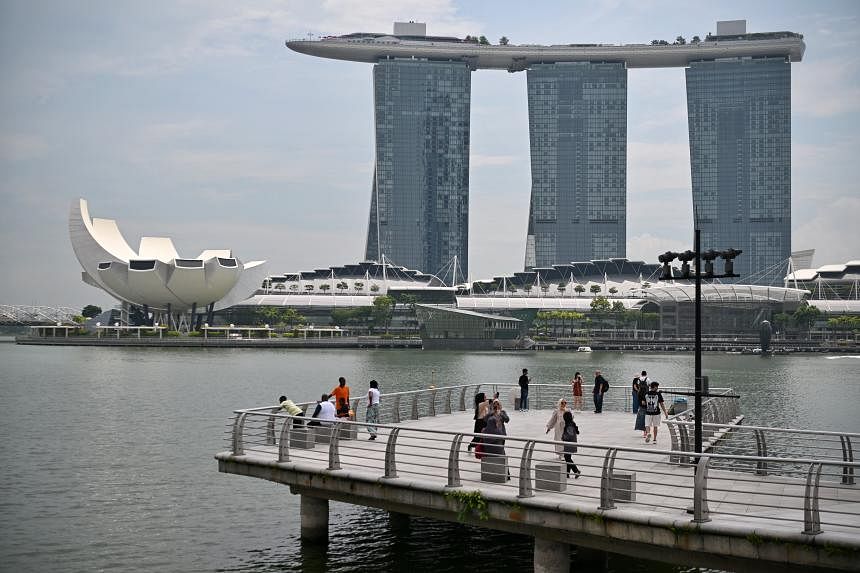BEIJING - Shanghai resident Jack Wu is looking forward to visiting Singapore in 2024, where he hopes to catch up with university friends and explore places such as Gardens by the Bay.
It will be his first trip to Singapore since the Covid-19 pandemic.
“I wanted to go to Singapore in September this year to attend an alumni gathering, but the thought of applying for a visa put me off,” the 28-year-old business consultant told The Straits Times.
A 30-day mutual visa exemption arrangement between Singapore and China was announced on Dec 7 at the 19th Joint Council for Bilateral Cooperation meeting in Beijing.
The changes are expected to take effect in early 2024.
Singaporeans, who now enjoy a 15-day visa-free arrangement when they visit mainland China, will be able to double the length of their stay to 30 days without the need for a visa.
The Chinese will also no longer need to apply for a visa when they visit Singapore, and can stay for up to 30 days without a visa. The average length of stay for Chinese visitors from January to October this year is 5.2 days, Singapore Tourism Board data showed.
On microblogging site Weibo, the topic of the mutual visa exemption was the second most searched-for topic at one point, with 120 million views and 26,000 discussion threads.
Chinese netizens were mostly excited about visiting the hometown of Singaporean singer Lin Junjie, more popularly known as JJ Lin.
Trip.com and Ctrip said the search volume for Singapore on their sites rose by 80 per cent in the hour after the announcement of the news, compared with the hour before, with flight ticket searches going up 90 per cent and hotel searches increasing 50 per cent.
The current average length of stay is five days for Singaporeans in China and four days for the Chinese visiting Singapore, data from the two travel sites showed. The mainland Chinese cities most popular with visiting Singaporeans are Shanghai, Beijing and Guangzhou.
Chinese travel app Tongcheng Travel said searches for travel to Singapore grew 18 per cent from Dec 6, a day before the announcement, with most of the queries from netizens in southern Guangdong and eastern Jiangsu provinces and financial hub Shanghai.
Searches for tourist sites in Singapore also surged after the announcement.
On Chinese travel app Qunar, the search volume for tickets to Universal Studios Singapore shot up by 40 per cent month on month, Chinese state media Global Times reported.
Mr Liu Qi, who manages tours for the Chinese to Singapore, Malaysia and Thailand, said bookings for Singapore tours are at about 80 per cent of 2019 levels at his travel agency in Beijing. Singapore tours are usually combined with visits to either Malaysia or Malaysia as well as Thailand.
Thailand and Malaysia had earlier introduced visa exemptions for Chinese visitors.
Mr Liu said Singapore’s visa-free arrangement will make his work, which includes applying for travel visas for the Chinese, much easier. It costs around 200 yuan (S$37.50) to apply for a visa, he said. “The change will make our tours cheaper and more attractive to the Chinese, helping our agency’s recovery from the pandemic,” he added.
In comparison, Singaporean reactions to the new visa exemption arrangement were more muted.
Media manager Tan Jo Ee, 27, who has booked tickets to visit Beijing with her friends for seven days in March 2024, said the change will “not be significant” for her trip.
But Ms Tan, who looks forward to visiting the Great Wall, Forbidden City and Universal Studios Beijing, said her colleagues have “all been mentioning that they want to visit China”.
“A lot of airlines are having sales, and more people are considering China as a tourist destination,” she added.
Singapore tour agency Chan Brothers Travel said the change is “likely to be less consequential” for it, as most of its outbound leisure tour group trips are fewer than 15 days.
Still, its senior marketing communications manager Jeremiah Wong said the change is likely to have a positive impact on other groups of travellers. These include people on private tours of more than 15 days, those visiting friends and relatives or business travellers who need extended stays.


